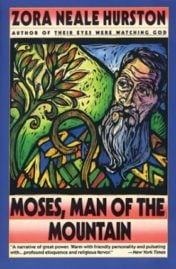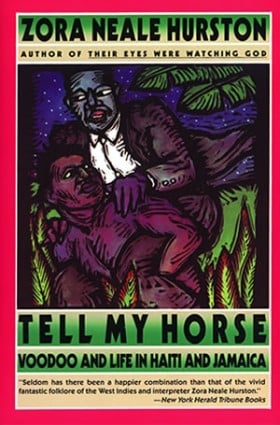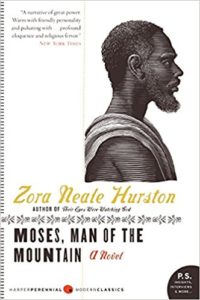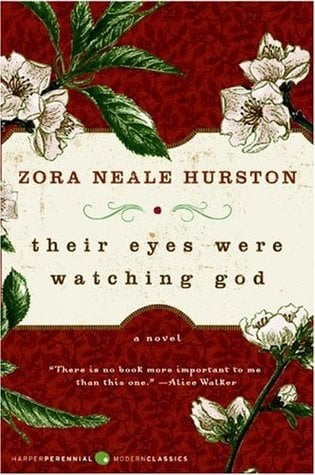Moses, Man of the Mountain by Zora Neale Hurston (1939)
By Emma Ward | On April 29, 2017 | Updated October 8, 2022 | Comments (0)

Zora Neale Hurston reveals her strength as a writer through character development and use of narration. Her 1939 novel, Moses, Man of the Mountain, tells the story of Moses and the Book of Exodus from an African-American perspective.
The Zora Neale Hurston Digital archive describes the book:
“Moses, Man of the Mountain is Zora Neale Hurston’s attempt at re-writing (or re-righting) the Bible from an Afro-American perspective. She retells the story of the Exodus, which is the triumphant tale of Moses and the Israelites’ escape from Egyptian slavery.”
This story has resonated in the African-American community for centuries, according to Albert Raboteau, who writes in Slave Religion:
“The symbols, myths and values of Judeo-Christian tradition helped form the slave community’s image of itself.’ Hurston’s image of Moses is that he is African and his people are African-Americans … She then tells Moses’s story, beginning with his escape in the basket of bulrushes and culminating in his role as the great conjurer, the ‘power doctor’ of humankind.”
Zora adds her unique embellishments to the tale. She depicts Moses growing up in the Pharaoh’s palace as his grandson and as the commander of the Egyptian armies. As his power grows, so too, does his realization of the realities of the Hebrew slaves. And the story wouldn’t be complete without Moses’ encounter with the burning bush.
“In Hurston’s view” concludes the synopsis of the book on the aforementioned archive, “Moses is a down-to-earth man; yet, he is also a hoodoo master: ‘He knows the ways and meaning of Light and he heard the voice of Darkness and knew its thoughts.’ She shows how he is transformed once he takes up the cause of the oppressed.”
Initial reception of Moses, Man of the Mountain
Zora, who had worked long and hard on this novel, was disappointed at the mixed reaction to the book upon its publication. She received some positive reviews from white newspapers and magazines, but as usual, her harshest critics were black.
Ralph Ellison wrote: “This work sets out to do for Moses what The Green Pastures did for Jehova; for Negro fiction, it did nothing.” Alain Locke wrote that it was “caricature rather than portraiture.”
The pain of the book’s middling reception was compounded by Zora’s latest failing marriage. In 1939 she married Albert Price III, who was 23 to her 38 (or older, for she had long been prone to make herself much younger than she really was).
By early 1940, she divorced Price, citing excessive drinking and abuse. About the Moses, Man of the Mountain, she wrote a friend:
“I have the feeling of disappointment about it. I don’t think that I achieved all that I set out to do. I thought that in this book I would achieve my ideal, but it seems that I have not yet reached it … it still doesn’t say all that I want it to say.”
. . . . . . . . . .

See also: Tell My Horse by Zora Neale Hurston
. . . . . . . . . .
A critical analysis from Zora Neale Hurston: A Literary Biography
Robert E. Hemenway adds to the understanding of this novel, unusual even by Zora’s standards, in Zora Neale Hurston: A Literary Biography:
“Moses, Man of the Mountain is a large novel, by far Zora’s most ambitious book. It does not always achieve its own aspirations, but this is no excuse for its critical neglect.
Even informed literary scholars have been misled by the novel; Robert Bone, for example, refers to it as a book of folklore. Only Darwin Turner, in an essay uniformly hostile to Zora, has assessed it properly:
‘If she had written nothing else, Miss Hurston would deserve recognition for this book.’
Zora attempts nothing less than to kidnap Moses from Judeo-Christian tradition, claiming that his true birthright is African and that his true constituency is Afro-American. Her audacity stemmed from a knowledge of the way legends grow and from the historical evidence indicating that Moses was probably Egyptian rather than Hebrew.
In 1937, two years before Moses was published, Freud had published two controversial essays in the famous German psychoanalytical journal Imago, which drew from sketchy historical evidence that Moses was Egyptian, but also that the monotheistic religion he brought to the Hebrews originated with a heretical ruler of Egyptian antiquity …
Zora may have read Freud’s article or she may have come to her vision independently; whatever her source, she clearly holds that Moses was an Egyptian whom Jewish myth undertook to transform into a Jew.
Zora’s purpose is not so much to debunk a Judeo-Christian prophet as to remove him from scripture in order to relocate him to Afro-American tradition …
To fully understand what Zora attempted in this novel, one must remember the identification made by captive black slaves in America with the children of Israel in Egypt, and the resulting role that Moses played in Afro-American folklore.
Black spirituals are full of references to Moses. Moses was ‘an infant cast away, by Pharoah’s daughter found.’ He goes down to Egypt to tell ole Pharaoh to ‘let my people go.’ … It is the slaves’ identity as a chosen people that Zora utilizes to tell Moses’ story, an identity rich with complexity.”
A 1939 review of Moses, Man of the Mountain
Here’s a review from the time when the novel was first published (please note that is uses the parlance of that day):
A review of Moses, Man of the Mountain by Zora Neale Hurston in the Los Angeles Times, November 26, 1939:
Here is a most refreshing and diverting book.It possesses that quality of mystical naivety and primitive reverence which endowed “Green Pastures” with beauty. Quite simply it is the Biblical chapter “Exodus” as it might have occurred to an Israel composed of black folk.
An engaging aspect of this tale lies in the author’s complete self-effacement. Miss Hurston does not interrupt the legend to make interpretations.
She lets a Moses, whose conversation is curiously flavored with the vernacular of the American Southern dark, think his own thoughts; and they are good, honest, wise conclusions, adaptable to our own unsettled times.
“This freedom is a funny thing,” he tells the people whom he has delivered out of bondage, when they offer him a crown at Jeshurun.
“It ain’t something permanent like rocks and hills. It’s like manna; you just got to keep on gathering it fresh every day. If you don’t one day you’re going to find you ain’t got no more. You done got free of Pharaoh and the Egyptian oppressors; be careful you don’t raise up none among yourselves.”
The narrative ends with the death of Moses on the sacred mountain. The scene is embellished with all the religious magic and pious necromancy which clothe the American Negro’s conception of the Old Testament “Voodoo Man.” Miss Hurston’s writing achieves, at times, a weird beauty of its own.
Moses, Man of the Mountain, her fifth book, combines a stately charm with the humor of anachronism, and a warmth of characterization that vitalizes the devout fortitude and faith of the Negro spirit.
. . . . . . . . . .
. . . . . . . . . .
More about Moses, Man of the Mountain
. . . . . . . . .
See also: Their Eyes Were Watching God (1937)
. . . . . . . . .
Quotes from Moses, Man of the Mountain
“How can a nation speak with one voice if they are not one? Don’t forget, now. If you do, you encourage all the stupid but greedy and ambitious to sprout like toadstools and that’s the end of right and reason in the state.
. . . . . . . . . .
“Night came walking through Egypt swishing her black dress.”
. . . . . . . . . .
“She must lend her ears to the sounds of mighty words boiling out of futile men. She must bear something in male form, for after all that is what she was born for—a passageway for boy children.”
. . . . . . . . . .
“It’s bad to have some power, but not enough.”
. . . . . . . . . .
They were still a horde of slaves, then. To his dying day he would always feel bad about this first great failure of his. But, well, anyway, this time Israel had her songs and her singers. Israel had a fine army of fighters. Israel had laws on tables of stone and Israel had a God.
He had lifted their eyes to the mountain. Out of a rotting mass of creeds he had made a religion that had height and depth. Of course, he had made his mistakes and had his regrets. But every heart has its graveyard.”
. . . . . . . . . .
“What would slaves want to be free for anyway? They are being fed and taken care of. What more could they want?”


Leave a Reply